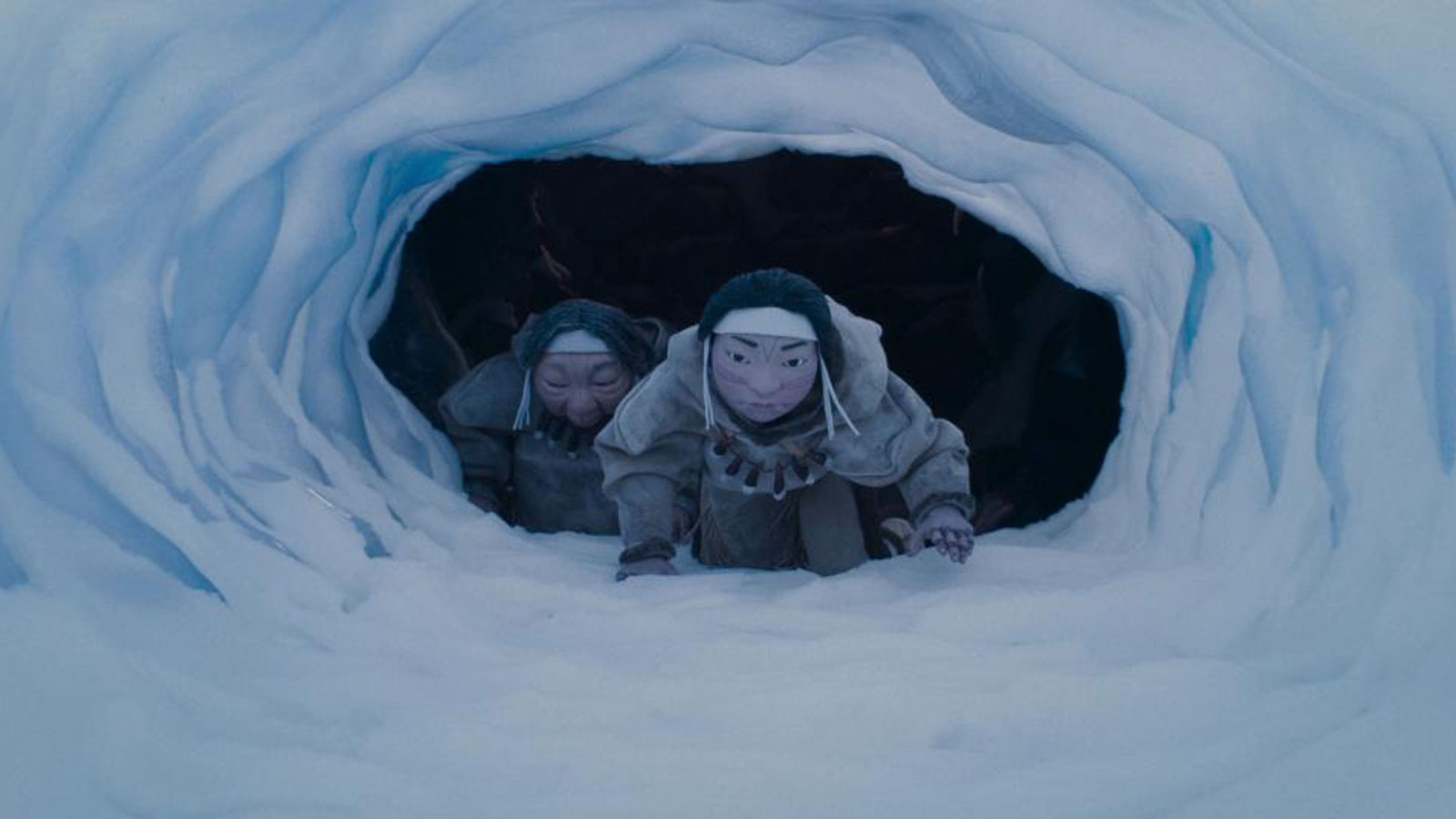Searching for solutions, Zacharias Kunuk’s latest film takes a grounded, Indigenous approach.

Indigenous people are frequently asked for solutions based on traditional knowledge. From environmental stewardship to psychedelics and mental health, the thirst for “ancient” answers to contemporary problems can run a wide gamut. But in legendary Inuit filmmaker Zacharias Kunuk’s latest animated short, Angakuksajaujuq: The Shaman’s Apprentice, that notion of easy answers is turned on its head.
The film, which was recently shortlisted for the Academy Award for Best Animated Short, follows a shaman and her titular apprentice after they are summoned to heal a sick community member. After traveling across the icy landscape, the pair arrive to administer aid to the patient, a young hunter sick with fever. During their first attempt to heal the man, the shaman asks him, “Did you do anything to deserve this?” The unspoken question here is: Is this man living a proper Inuit life or has he strayed too far away? In this sense, the shaman and her apprentice act not only as healers but as keepers of tradition. This will become clearer later in the film as the pair embark on a trip to the Underground to visit The One Below for answers. They seek not only to understand the hunter’s dilemma, but also to determine the next steps in how to fix it.
The Shaman’s Apprentice is not a “climate” movie per se, but its icy setting and theme – the search for a solution – will feel highly relevant to climate-concerned viewers. In this sense, it is likely to draw comparisons to recent disaster films like Don’t Look Up, which offers funny, easy, and some might say mean-spirited answers to our current climate dilemma. But an Indigenous film like The Shaman’s Apprentice relies more on interpretation, experience, observation and introspection than flashy hijinks. The director does not hate on his subjects; there will be no destroying of a whole arctic village for laughs. It is clear that Kunuk feels a deep connection to this community. He does not have the luxury to blithely kill off his subjects as a cautionary tale.
Many non-Indigenous viewers will not have heard of Kunuk (which is, again, why Indigenous films like these are important contributions to our current cinematic landscape) but the 63-year-old Inuk filmmaker has been making movies for over 20 years. Standouts include Atanarjuat:The Fast Runner in 2001, and The Journals of Knud Rasmussen in 2006, both of which depict slices of traditional Inuit life and culture. What makes Kunuk’s films stand out in particular is their authenticity. They are raw and real. You feel cold when you see his characters in their arctic conditions. You feel the isolation, the hard work it must be to live in Inuit country, especially for those of us who are nowhere near such a region. They deal with very basic things like love, death, jealousy, trust, and life in a region and community far away from a local grocery store or hospital.
Kunuk is not known for animated films, but one could say after viewing The Shaman’s Apprentice that maybe he ought to delve into the genre again. The animation is mesmerizing. Lines in the elder Shaman’s face are oh-so-subtle: the droop in her mouth, the way her eyes narrow with concern when faced with a dilemma. The animators somehow make the Shaman older and wiser in ways that differentiate her from her younger apprentice. They have traditional Inuit tattoos. Light and shadow dance off their faces to illustrate dramatic mood and tone, just as they would on actual human beings. I’d argue that half the fun of watching a stop motion film such as this is shouting to yourself or whomever you’re watching the film with, “How did they do that?”
But for all its artful craft, one might say Kunuk is more invested in this story, and in that way, humanity at large. He’s fascinated in the way knowledge is passed on and the ways people must rely on each other; In the way that humanity can course correct itself when needed.

In Kunuk’s world, life is beautiful and complicated. The film draws from a traditional Inuit story, one in which the protagonists must trust each other and draw upon a faith deep within. At the beginning of the journey to the Underground, the Shaman tells her apprentice, “If you lack confidence you may not return, do you understand?” The apprentice simply looks back with a look on her face that says, fake it til you make it.
Subtle moments like these remind us that representation is more than an oft-repeated refrain in 2022. Indigenous-made TV like Reservation Dogs and Rutherford Falls have reinforced just how much better Indigenous films are when they are made with authenticity. No longer do we have to wonder, “Is this really an Indigenous point of view?” because the new work being created is Indigenous made. When we see stories like The Shaman’s Apprentice, that references an Inuit deity from the Underground called Kannaaluk, we can trust that Kunuk is telling us a story from his vantage point, from his community.
And not to beat up on blockbusters like Don’t Look Up, which admittedly made me laugh more than a few times, films like The Shaman’s Apprentice are likely to stay with you longer. It isn’t just because it’s an Indigenous film made by an Indigenous director which touches on Indigenous themes like respect for elders and teachings as well as the unique ways we pass down knowledge. It has more to do with how films like Don’t Look Up aim for low hanging fruit that comes from a detached place of privilege. In contrast, stories like Kunuk’s are timeless; a more substantial meal as opposed to something fun, quick and easy to consume mindlessly. GRIST






No comments:
Post a Comment
Please leave a comment.